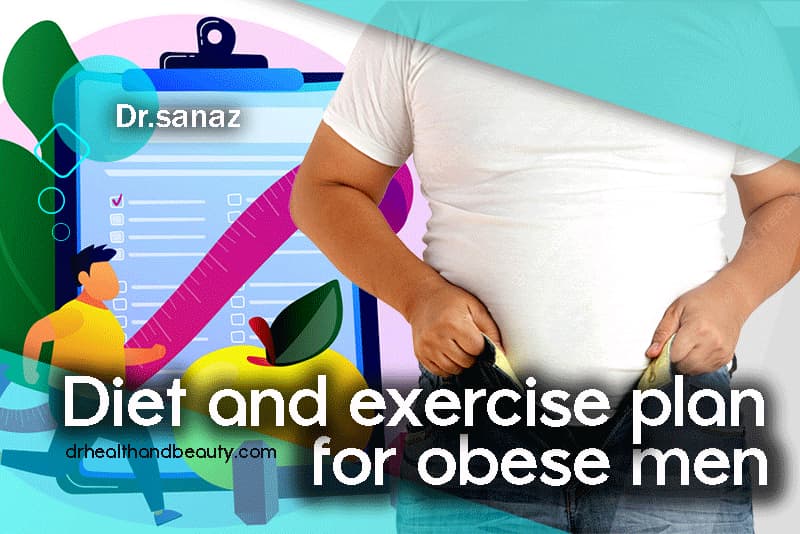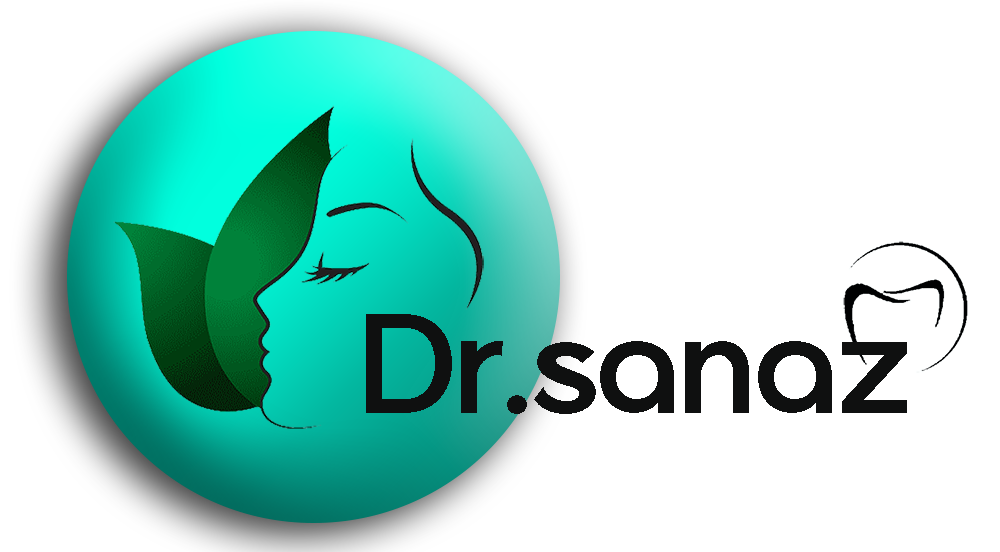
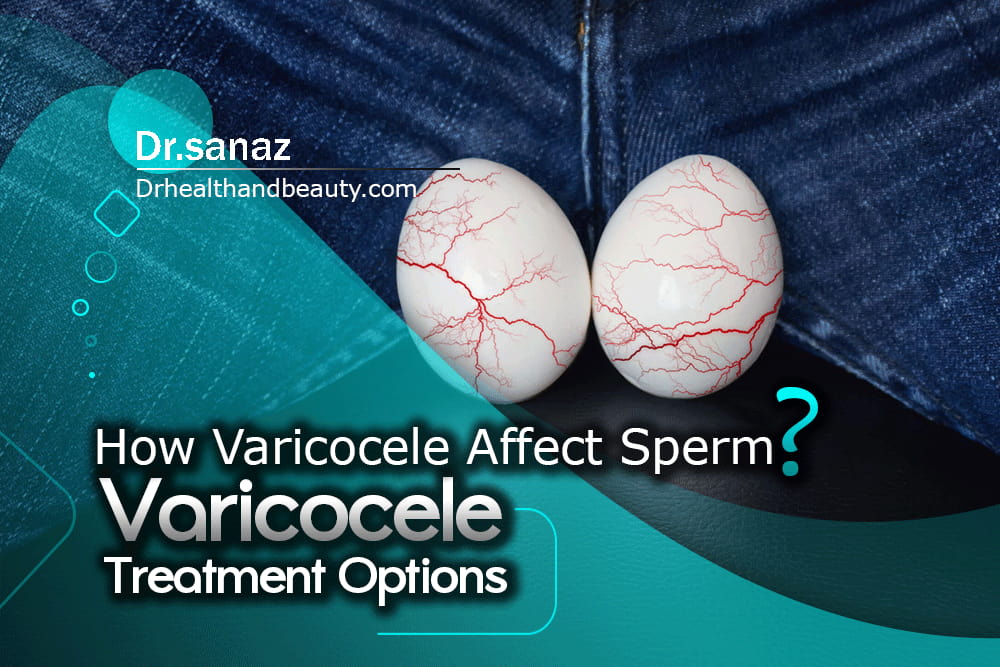
How Does Varicocele Affect Sperm? Varicocele Treatment Options
Table of Contents
The scrotum is a skin bag that holds the testicles inside. This sac also contains arteries and veins that supply blood to the gonads. Dysfunction of a vein inside the scrotum can lead to a varicocele. Varicocele is a relatively common problem and disease among men, which can lead to irreparable consequences, such as infertility if it worsens. In this article of “Drhealthandbeauty”, we provide complete explanations of this disease and Varicocele Treatment.
Varicocele means varicose veins or dilation of the scrotum’s internal veins, also called plexuses. Varicocele is a prevalent male disease that affects 15% of adult men and 20% of adolescents. Of course, it generally happens mainly between 15 and 25.
This disease usually occurs during puberty, and it is more likely to occur in the left testicle because the anatomy of the right and left sides of the human body is not the same. Rarely, varicocele occurs in both testicles, but the possibility is not zero. It should also be said that all types of varicoceles cannot affect sperm production.
This problem occurs only in the scrotum and is similar to varicose veins. This problem can lead to a decrease in sperm production and quality, which sometimes causes male infertility and the shrinking of the testicles. Therefore, treatment of varicocele will be necessary.

How to diagnose varicocele?
Many men do not know they have a varicocele because it often has no symptoms. However, varicocele is very common, and about 10-15% of men suffer.
What are the symptoms of testicular varicose veins?
Although many patients with a varicocele do not have any symptoms, these patients have many common symptoms that are often ignored. Some of these symptoms include:
- The size and tortuousness of the veins (asteroids) inside the scrotum which is similar to a bag of worms.
- The feeling of heaviness, cramping, and pain in the skin of the testicles
- A lump or nodule inside the testicle that does not hurt
- One of the testicles is more significant or heavier than the other.
- Pain that is aggravated when standing but calms down when lying down.
- Decreased sperm count
- Pain that worsens after vigorous activity.
- Pain aggravated by heat.
Varicoceles are identified through scrotal self-examination or during a routine doctor’s exam and are described as “sacs of worms” because of how they look and feel.
Urologists often examine the patient standing up to diagnose varicocele. While examining the sac above your scrotum, your doctor may ask you to take a deep breath, hold your breath, and wait. This technique, known as the Valsalva maneuver, allows the urologist to examine the enlarged veins. to find
In addition to a physical examination, the doctor may also prescribe an ultrasound examination of the scrotum. Ultrasound uses sound waves to take pictures of your body. Signs of varicocele on ultrasound are veins that are wider than 3 mm and blood flows in the wrong direction during the Valsalva maneuver. Ultrasound can also show the size of the testicles. These symptoms help to decide how to treat teenagers, and varicocele treatment may be an option that cannot be ignored. But if there is no problem in physical examination, ultrasound is not necessary.
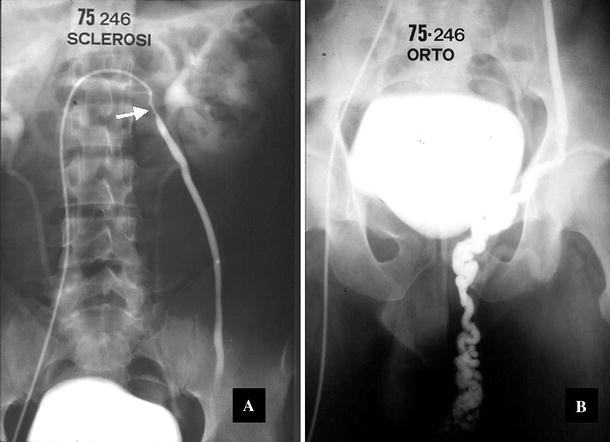
Causes of varicocele
The male reproductive system, the spermatic cord, transports blood to and from the testicles. There are many reasons for varicocele disease. The valves in the veins may not work correctly (or may break). If blood flow is slow, blood may pool in the veins. Also, the larger vessels that travel from the testicles to the heart connect differently on the left and right sides.
Therefore, on the left side of the testicle, more pressure is needed for the blood to flow in the veins toward the heart. If blood flows backward in the veins, it can cause them to swell. Sometimes, you notice swollen lymph nodes or other masses in the back of your abdomen block blood flow. This can lead to the sudden swelling of the scrotal veins, which will be painful in most cases.
To understand the importance of blood circulation in the body read the article “The Science of White Blood Cells: Inside the Body’s Invisible Army“.
However, many experts believe that varicocele is formed when the valves of the veins inside the spermatic cord prevent the proper flow of blood. As a result, the vessels expand to compensate for this problem. Vascular dilation can damage the testicles and make male fertility difficult.
When can varicocele be dangerous?
This disease can be dangerous and requires definitive varicocele treatment when it causes the following problems:
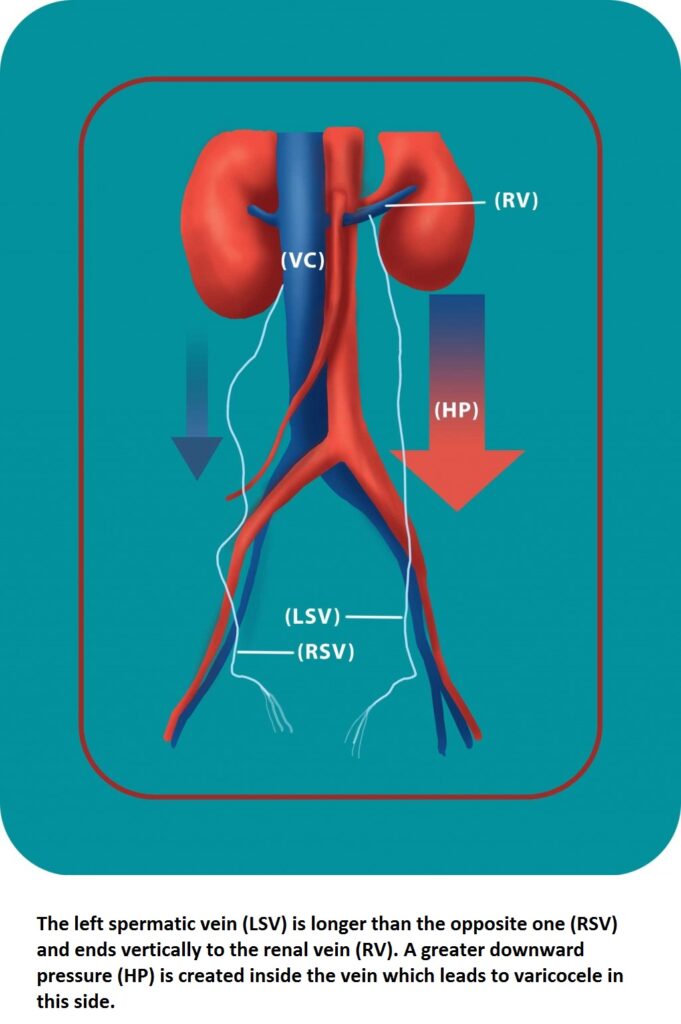
Infertility or affecting fertility
Studies show that the percentage of infertility in men with varicocele is much higher than in men who do not have varicocele. However, there is a theory that the reason for this is that the temperature of the scrotum rises due to the accumulation of blood. It can lead to a decrease in the number and quality of sperm and, eventually, infertility. Even if one of the testicles is infected with varicocele, the temperature of both testicles may increase due to the accumulation of blood in the dilated vessels.
Research shows that 25% of men who have problems with sperm testing have a varicocele, and by varicocele treatment, their sperm quality improves. Remember that not all men with varicocele are infertile and can have children.
Today, it is recommended that varicocele treatment is necessary only when it has the following characteristics.
- In addition to being identified in the scan, it also shows itself in the tests.
- The number of sperm is low, and the person has been infertile for two years.
- There is no other logical reason for a person’s infertility.

Small testicles
If a teenager has a large varicocele, his testicles may not grow enough. In these cases, the doctor may recommend that the testicles be measured annually. However, the testicles may remain smaller than their normal state forever, which can also be one of the causes of infertility. In that situation the treatment of varicocele is vital.
Varicocele in old age
The sudden onset of varicocele can be a symptom of a blockage of one of the large abdominal veins. This condition only happens in men over 40, which is rare. Therefore, yes, there is a possibility of sudden varicose veins of the testicles even in old age.
Varicocele and its Relation to Masturbation
Varicocele has several grades. In high degrees (3-4), it disrupts sperm production and sterility, which must be treated surgically. Mild degrees should be under the supervision of a urologist.
Masturbation does not change the average size of the testicles. Although some diseases and problems can change the size of the testicles, the reason for the change in the size of the testicles is not masturbation; to determine whether the testicle size is normal or abnormal, an examination by a urologist is necessary.
The size of the testicle should be more than 2 to 2.5 cm. It is expected that one is more extensive; masturbation does not cause infertility but in addition to physical problems such as damage to the reproductive system, poor vision, physical weakness and bruises, paleness, bruises around the eyes, extreme fatigue, and lethargy, excessive sleepiness, weakness, and lethargy. Body tremors, weak memory, also the person experiences emotional emptiness, depression, anxiety, and lack of self-confidence. After marriage, he is no longer stimulated in a marital relationship and has difficulty reaching orgasm.

The link between varicocele and low testosterone
Some studies have shown a link between varicocele and low testosterone. Low testosterone can make you feel unwell and negatively affect your health, sex life, and overall health. Low testosterone can cause various symptoms, including weight gain, decreased sexual arousal, fatigue, erectile dysfunction, depression, difficulty sleeping, and difficulty concentrating.
Treatment of varicocele
A varicocele treatment may not be necessary at all. Many men with varicocele can have children without any Varicocele Treatment.
There is no medicine for varicocele treatment or prevention of varicocele. However, pain relievers (such as acetaminophen or ibuprofen) may help reduce pain.
If varicocele treatment is needed, surgery is the primary type of Varicocele Treatment. Embolization (briefly blocking the veins) is a non-invasive surgical treatment option; however, if the varicocele causes pain, dry testicular skin, and infertility, or if the person is looking for assisted reproductive methods, surgery should be performed.
Varicocele treatment with varicocele surgery means closing the problematic vein and allowing blood to flow into other healthy veins. If a person is infertile, surgery can improve the quality of sperm or treat the person’s infertility.
Symptoms of severe varicocele in teenagers include dry testicular skin, pain, or abnormal semen test results. In general, the treatment of varicocele improves sperm characteristics, but it is not yet clear whether not treating varicocele can lead to the deterioration of sperm quality or not.
Varicocele treatment by surgery can have complications such as:
- Fluid production around the testicles
- Recurrence of varicocele
- infection
- Damage to the artery
- surgery
Surgery can be performed in three ways to treat varicocele. These three methods are further explained below:
- Varicocelectomy
The first option for varicocele treatment is Open varicocelectomy, Open varicocelectomy is performed under anesthesia or local anesthesia. The surgeon accesses the varicocele through the groin or, in some rare cases, through the abdomen. The problematic vessel is closed using ultrasound and surgical microscopes, and the blood flows through the rest of the healthy vessels. After the surgery, the patient feels little pain and can resume daily activities.
- laparoscopy
The second option for varicocele treatment is laparoscopy. in this method, the surgeon makes a small incision in the abdomen, and through that hole, a small tool is inserted into the body to close the vein.

- Percutaneous embolism
The radiologist inserts a tube or catheter into the body through the neck or groin. Surgical instruments pass through the tube, and the surgeon uses springs and chemicals to wound and closes the target vessel. This type of surgery is minimally invasive and can be performed outpatient. The recovery period for this type of surgery is also concise.
What is the care after surgery to remove varicose veins?
After surgery, the patient may feel pain in the groin for 3 to 6 weeks. Also, the scrotum and groin may be swollen and bruised, which will disappear after 3 to 4 weeks.
Depending on his job, the patient can return to work 2-3 days after laparoscopic surgery. If the patient’s job involves vigorous activity or heavy lifting, he should refrain from doing it for at least a week. If you have had open surgery, returning to your daily routine and work may take longer. Using the protective shorts available in pharmacies for two weeks after the surgery is better.

Non-surgical treatment
- Subcutaneous embolization
Varicocele embolization is a non-surgical method and an alternative to other surgical methods of Varicocele Treatment. In this procedure, a vein is blocked by creating a slight blockage. An imaging specialist (radiologist) inserts a small tube into a vein in your groin or neck. A local anesthetic will be used at the injection site, and you may be given a sedative to reduce discomfort and help you relax.
Using imaging on the monitor, the tube is guided to the treatment site in the groin. The radiologist releases coils or a solution that causes scarring and blockages in the testicular veins. This procedure takes about an hour.
The time of this treatment is short, and it only causes mild pain. You will likely be able to return to work within 1-2 days and resume exercise in about a week. Ask your radiologist when you can resume all activities.
Conclusion
A varicose vein in the testicle, known as a varicocele, is not always harmful to your health, but it can sometimes cause testicular pain or other unwanted symptoms. Most of the time, varicoceles are harmless and do not cause any problems. A varicocele can cause pain, infertility problems, or slow or reduced growth in the testicles in some rare cases.
In general, varicocele treatment is only necessary for infertility if the disease causes persistent pain or discomfort (even after non-surgical treatments such as anti-inflammatory drugs and wearing underwear or a scrotum) or if there is significant atrophy of the testicles. Surgical varicocele treatment usually involves tying off the affected vein to direct blood flow to normal veins. Varicocele treatment is performed as an outpatient varicocele surgery and may be open or laparoscopic.
References:
Share in :
Explore more

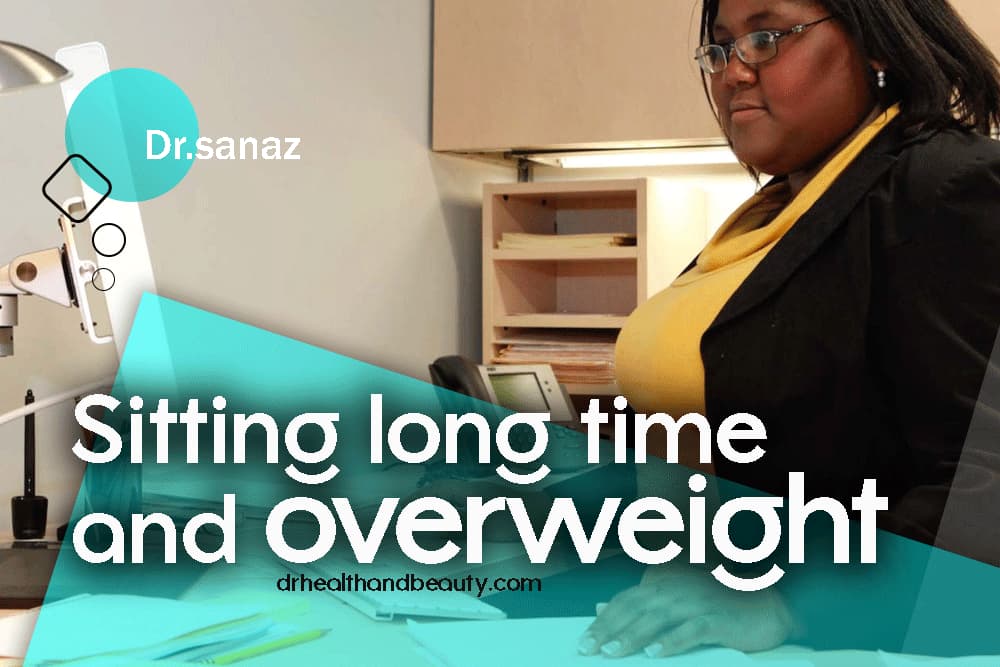
Sitting A Long Time And Being Overweight- Drhealthandbeauty
